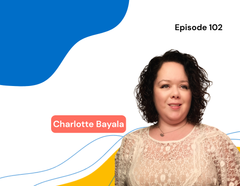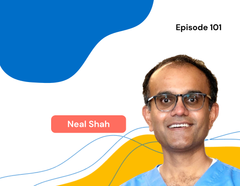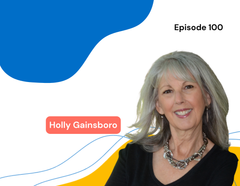When Susan was diagnosed with breast cancer in 2021, she didn’t tell anyone—not even her closest friends. “I couldn’t say the words ‘I have breast cancer’ without ugly crying,” she recalls. “I just couldn’t do it.”
A healthy, active woman who once ran 65 half-marathons by the time she turned 65, Susan wasn’t used to feeling powerless. Her medical history was practically spotless: tonsillectomy at 16, two children born in the 1980s without pain medication, and a lifetime of good health. Cancer felt like a betrayal—and the pink ribbons that filled her world every October only deepened her frustration.
“Leave it to you, Susan,” a friend later joked, “to tell no one you had breast cancer—and then write a book about it.”
In this episode of The Patient From Hell, host Samira Daswani speaks with Susan, author of I Hate the Color Pink, about reclaiming agency in the midst of fear, the gender dynamics of diagnosis, and how running—and writing—helped her heal.
When “Routine” Becomes Reality
For years, Susan never missed her annual mammogram, even during COVID. But in November 2021, two days after her appointment, the phone rang. “We want you back,” they said. “For another mammogram, biopsy, and ultrasound.”
The biopsy was brutal. “I left with a metal clip in my breast, an ice pack in my bra, and tears streaming down my face,” she says. “I had no business driving that car.”
She didn’t let her husband come. “I wasn’t ready for it to be real,” she explains. “You know how sometimes your heart knows something your head doesn’t want to admit?”
Two days later, she heard the words invasive ductal carcinoma.
Asking the Hard Questions
When she learned she’d need surgery, Susan made a small but pivotal decision. “I asked the scheduler, ‘If this were happening to your body, which surgeon would you choose?’” The woman hesitated—then quietly said, ‘Dr. Ran Lubie. She’s amazing.’
That moment changed everything. Her female surgeon walked into the room knowing every detail of her case—and delivered news Susan wasn’t prepared for: the tumor’s location meant removing her nipple.
Tears filled Susan’s eyes. Her husband, ever pragmatic, said, “This is all great news.” She shot back, “What did you just hear that I didn’t?” Then, in a flash of gallows humor, she told him, “We’re going to cut off an inch of your penis. It’ll still work, don’t worry.”
That exchange became a metaphor for how men and women process health crises differently. “Men want to fix things,” she laughs. “Women want to talk, cry, talk some more, and then talk again—with a glass of wine.”
Finding Her Tribe
Through surgery, radiation, and recovery, Susan learned that isolation was unsustainable. “Find your tribe,” she says. “Find the women who lift you up, who celebrate your wins, and don’t drain your energy.”
During treatment, she wasn’t allowed to have anyone accompany her due to COVID restrictions. “Walking into that hospital alone was one of the hardest moments of my life,” she says. But afterward, she built connections that carried her forward.
From Runner to Survivor
At 56, Susan had surprised herself by taking up running. She wasn’t fast—but she was relentless. After surgery, she asked her doctor when she could start again. “Thirty days,” the surgeon said. On day thirty-one, she laced up her shoes, wrapped herself tight, and ran.
“I couldn’t control much during treatment,” she says. “But I could control my attitude and my exercise. Those two things kept me sane.”
From Notes to Narrative
A friend had told her early on, “Buy a black-and-white composition book. Write down every question, every appointment, every feeling.” So she did—and it became her lifeline.
Soon, she began pasting in encouraging texts from her grandchildren, who called her Grammy. Those words—of love, fear, resilience—became the backbone of her book.
“I realized I already had a story,” she says. “Writing kept me from the depths of despair. It let me make sense of the chaos.”
Practical Lessons from Susan’s Story
Susan’s experience offers timeless wisdom for anyone facing a health crisis:
- Ask bold questions. “If you don’t understand something, keep asking. You deserve to know.”
- Be your own advocate. “If your doctor doesn’t like your questions, get a new one.”
- Find your tribe. Surround yourself with people who lift, not drain, your energy.
- Move your body. “You don’t have to run a half-marathon—just walk outside and hear the birds.”
- Write it down. Journaling can turn fear into clarity, and clarity into power.
About the Guest
Susan is an author, motivational speaker, and breast cancer survivor based in Southern California. Diagnosed with invasive ductal carcinoma in 2021, she underwent lumpectomy surgery and radiation, emerging with a deeper sense of humor, purpose, and resilience.
Her memoir, I Hate the Color Pink, chronicles the raw, funny, and deeply human journey of facing cancer, speaking up, and finding joy again. A lifelong runner and grandmother of three, Susan now shares her story to remind others that healing begins with honesty—and sometimes, a good pair of running shoes.



